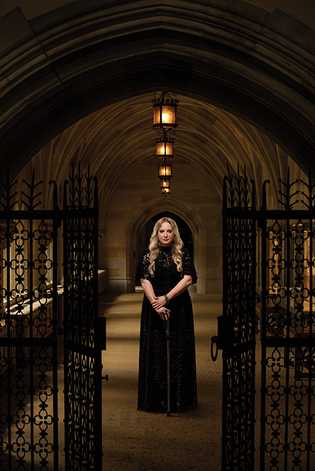
Bob Handelman
In this conversation,interviewer Anna Reisman ’86 discusses magic, ghosts, shame, and more with Leigh Bardugo ’97—who is standing in Sterling Library. (And if we’d known Skull and Bones could forecast stock market trends, we’d have tried a lot harder to join that club.)
View full image
In 2019, Leigh Bardugo ’97 published her first novel for adults, Ninth House. Bardugo was already well known for her popular young-adult “Grishaverse” fantasy novels, one of which, Shadow and Bone, is now a Netflix series. In the bestselling Ninth House, the first of a three-part series, first-year student Alex Stern learns that Yale’s secret societies each possess a certain type of magic; members of Skull and Bones, for example, can predict stock market trends through reading fresh human entrails. Alex can see and communicate with ghosts, so she’s a natural fit for Lethe, the organization tasked with monitoring the use of magic. In the trilogy’s second novel, Hell Bent, which came out earlier this year, Alex and a few others descend into hell on a dangerous rescue mission via a portal in Sterling Memorial Library.
Anna Reisman: What was it like to grow up in L.A. and then come to Yale?
Leigh Bardugo: My world was mall, home, school. It was very confined and constrained. I wondered if I would be somebody who always felt a step removed from the people around me. I don’t think that changed until I came to Yale. Yale had a kind of magic, an alchemy. It was where I discovered the people who were going to be some of my friends for life—where I became a person who could move through the world with some degree of confidence.
AR: Did you always want to be a writer?
LB: Writing when I was a teenager was almost a survival mechanism. It was a way of articulating feelings, of shifting my reality, of getting to live in a place that was more expansive and more interesting than the one I lived in. A world where being tough, being brave, being prepared, was actually meaningful. Those were qualities I could imagine having. Being cute, and being cheerful, and popular, and tan? Totally out of reach.
AR: Sterling Library is such a great portal to hell. Were any other Yale buildings in the running?
LB: It was always going to be Sterling. I wanted to create something where people could discover this place and follow the clues. A building that’s so bizarre and so effusive—the definition of extra—which is what I love about it.
AR: In Ninth House, there’s a disturbingly realistic scene of sexual assault that involves a magic potion, but it just as easily could have been a date rape drug.
LB: Magic in these books operates as just another type of influence. It’s no different from social influence, economic influence. For me, it was important that it had the same costs, that it’s hoarded and abused in the same way as other kinds of power. And if you put that kind of power in the hands of a bunch of undergraduates, what do you think is going to happen?
AR: Right, with their underdeveloped brains . . .
LB: I mean, I know plenty of people with supposedly developed brains who I wouldn’t trust with a magic spell. If you’re going to talk about an institution like this, you’re going to be touching on topics like class, privilege, sex, gender, and what it means to move through this world if you don’t have that privilege. And if you don’t address this then you’re not writing honestly. So it’s not like I approached this series with some sort of agenda, but I wanted to be as honest as I could about what these experiences could be like.
AR: I found it particularly compelling that the demons that haunt some of your characters thrive on human emotion, especially shame.
LB: What drives so much of my fiction is the idea of shame: what gives us shame and what we do to hide it. I wanted the audience to experience this in the heads of my characters, so when these demons appear readers understand the full weight of the inner shame that everyone is carrying.
AR: How have Yalies reacted to these two novels?
LB: I’ve been delightfully surprised. People understand this was not intended as some kind of takedown; it’s very much about the pleasures, as well as the perils, of this place. One doesn’t work without the other. This is a seduction in many ways.
AR: Can you tell me anything about the third book?
LB: I’ve written an outline. Only that part of the story will take place in New Haven. That’s all I can say.
 loading
loading